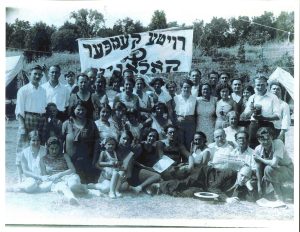 TORONTO — Thirteen years since the assassination of Israeli prime minister Yitzhak Rabin, left, people all over the world still gather to pay respect to a man who died as he lived, promoting the cause of peace in Israel.
TORONTO — Thirteen years since the assassination of Israeli prime minister Yitzhak Rabin, left, people all over the world still gather to pay respect to a man who died as he lived, promoting the cause of peace in Israel.
In Toronto, more than 300 people gathered Nov. 10 at the Lipa Green Building to take part in a memorial dedicated to Rabin, who was assassinated in 1995 by a Jewish extremist who opposed Rabin’s signing of the Oslo accords.
The service, both in Hebrew and English, included songs, a video presentation, dances and messages from community leaders, including UJA Federation of Greater Toronto’s chair David Koschitsky and Israel’s consul general in Toronto Amir Gissin.
Yaen Vered, a shaliach for the Israel Antiquities Authority who had a 24-year career in the Israeli military and retired as a colonel, was the keynote speaker.
Hassida David, the MC for the evening’s ceremony – organized by the Israeli House, a branch of the Israeli consulate that offers cultural and social programming for Toronto’s Israeli community – said she was one of the tens of thousands of people who gathered in the Rabin Square in Tel Aviv last year to participate in the 12th peace rally to pay her respect to the memory of a leader who was embarking on a road to peace.
“He was in the midst of paving a new way, but three shots, aimed at his back, not facing him, put a bitter end to all that he had worked for and fought for throughout his entire life,” David said.
“Around the area, where this despicable event took place, there were young people saluting, lighting candles, and amongst them was a young father, holding his three-year-old son on his shoulders.”
She said the little boy saw a picture of Rabin in his military uniform, when he was Israel’s chief of staff.
“The three-year-old child asked his father, ‘Dad, was he a soldier?’ He said, ‘Yes.’
“‘Did he die in the war?’ And he said, ‘Yes, in the war for peace.’”
David told the audience that they must embrace Rabin’s legacy and teach generations to come that “this is our only chance to live in our homeland far from bloodshed.”
Gissin attempted to relate the relationship of Rabin and Israel, to the relationship between Israelis and the Diaspora.
Consistent with the message Gissin usually delivers when speaking to a Jewish audience, he said that Israelis “have failed miserably to learn the lesson of Yitzhak Rabin’s death when we are conveying the Israeli message and building relationships with Jewish communities around the world.”
He said the biggest mistake Israelis make is to continue “in a very stubborn way” to involve Jewish communities in the Diaspora in Israel’s internal conflicts.
He added that the debate over borders is a legitimate one, but it is one best left for Israelis to deal with.
“It is the most important debate the Israeli society is facing… but when we speak to the world, especially when we talk to the Jewish community, we should remember that we’re gaining nothing by exporting the internal conflict.”
Koschitsky, speaking on behalf of UJA, commended Gissin for “speaking from the heart” but reminded the gathering of the Jewish value that “all of Israel [is] responsible for one another.
“This was prime minister Rabin’s legacy and we should live by it.”
Quoting Rabin from one of his addresses, Koschitsky said, “There is a very strong link that will forever be in our hearts. There is a sense of responsibility that we carry for each other, regardless of our diversified views.”
Vered, who said he knew Rabin vaguely, being in the outer circle of his acquaintances, spoke fondly about the kind of man Rabin was.
“He was flexible to changing his views and acknowledging mistakes. Rabin represents a generation that disappeared from the leadership ranks of Israel… He was a sabra that represented all the good we sabras acquire.”
He said the leaders who came after him were of the younger generation, all Israeli born, who knew of the Holocaust and the creation of the State of Israel through history lessons.
“That has much to say about what happened later in Israel.”
Vered said that the attitude in Israel after the Yom Kippur War in 1973 turned from “what can we give to the state” to “what can the state give to me.”
Although Israel is becoming increasingly westernized, and Israeli priorities are becoming more capitalist, he said “there exists no Jew, who doesn’t want peace. We pray for it in every prayer and every time we say Kaddish…
“There is a search and a real wish for peace. There are differences in views on how to achieve it, but the urge for peace didn’t fade away after the assassination of Rabin.”
He said that Rabin’s memory is a national one that doesn’t belong to any faction.
“Rabin model teaches us that you cannot kill democracy and democratic decisions by killing the torch holder. In democracy, we should discuss the important matters of communal life. We may differ in views, but respect the other side and his opinions,” Vered said.
“Rabin’s heritage is that.”






